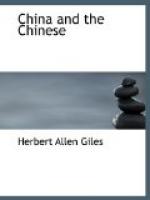The condition of the book is as good as could be expected, after six hundred years of wear and tear. Each leaf, here and there defective, is carefully mounted on sheets of stiff paper, and all together very few characters are really illegible, though sometimes the paper has slipped upon the printing-block, and has thus given, in several cases, a double outline.
Alongside of this stands the modern work of the kind, published in 1761, with an introductory poem from the pen of the Emperor Ch’ien Lung. It contains a much longer list of nations, including the British, French, Spanish, Dutch, Russians, Swedes, and others, and the illustrations—a man and woman of each country—are perfect triumphs of the block-cutter’s art, the lines being inconceivably fine.
* * * * *
Division D contains Poetry, Novels, and Plays. Under Poetry, in addition to collections of the works of this or that writer, there are numerous anthologies, to which the Chinese are very partial. The mass of Chinese poetry is so vast, that it is hopeless for the general reader to do much more than familiarise himself with the best specimens of the greatest poets. It is interesting to note that all the more extensive anthologies include a considerable number of poems by women, some of quite a high order.
Two years ago, an eminent scientist at Cambridge said to me, “Have the Chinese anything in the nature of poetry in their language?” In reply to this, I told him of a question once put to me by a friendly Mandarin in China: “Have you foreigners got books in your honourable country?” We are apt to smile at Chinese ignorance of Western institutions; but if we were Chinamen, the smile perhaps would sometimes be the other way about.
Such novels as we have in our library belong entirely to what may be called the classical school, and may from many points of view be regarded as genuine works of art. Besides these, there is in the market a huge quantity of fiction which appeals to the less highly educated classes, and even to those who are absolutely unable to read. For the latter, there are professional readers and story-tellers, who may often be seen at some convenient point in a Chinese town, delighting large audiences of coolies with tales of love, and war, and heroism, and self-sacrifice. These readers do not read the actual words of the book, which no coolie would understand, but transpose the book-language into the colloquial as they go along.
A propos of novels, I should like just to mention one, a romantic novel of war and adventure, based upon the History of the Three Kingdoms, third century A.D., an epoch when China was split up under three separate sovereigns, who fought one another very much after the style of the Wars of the Roses in English history. This novel, a very long one, occupies perhaps the warmest corner in the hearts of the Chinese people. They never tire of listening to its stirring episodes, its hair-breadth escapes, its successful ruses, and its appalling combats.




